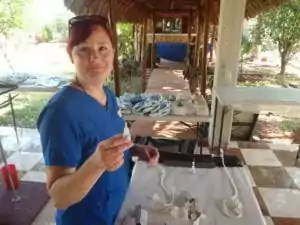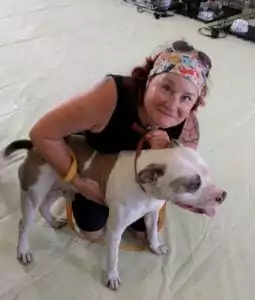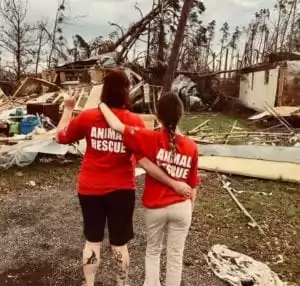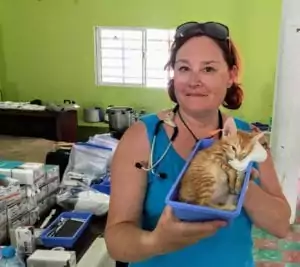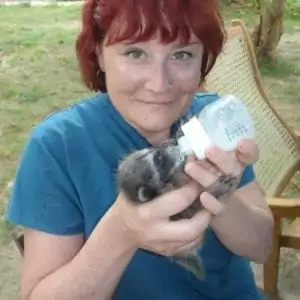Tell us something about yourself and your organization Vet Techs Without Borders
Vet Techs Without Borders’ mission is to improve animal welfare by connecting volunteer veterinary support staff to animal rescue organizations that need their help. Our model is to partner with existing rescue organizations and act as a liaison to help volunteers plan trips to the partner location that’s the best fit for them.
We work in spay/neuter, wildlife rescue, animal shelters, and disaster relief. In some cases, we are able to offer financial aid to help volunteers with travel expenses as well. As of today, we’ve worked in multiple locations in the USA, as well as Costa Rica, Guatemala, Mexico, and the Bahamas, and we’re always looking to add new partners in other countries.
In my 15+ years as an LVT I’ve worked in many different areas of vet medicine, but my passion has always been travel and rescue. In private practice, I kept meeting techs who had the desire to volunteer but didn’t know where to start.
I founded VTWB to help other techs and assistants experience the benefits of travel and service. Our roster includes volunteers from around the world with diverse backgrounds in different kinds of animal care. I’ve been fortunate to work with some amazing people, learn new things, and make lasting friendships. It’s truly a soul food!
Why did you decide to become a vet tech?
Animals have always been a big part of my life. I grew up on a small farm in the woods. My parents were always taking in stray dogs and cats and taught me the importance of kindness to animals. I have fond memories of riding my horse through the forest and getting up early every morning to milk my goat, as well as help with the birth of her kids, which was a profound experience and definitely contributed to my desire to pursue medicine.
I spent many hours playing in the forest surrounded by wildlife, which gave me an appreciation of and fascination with the natural world. It wasn’t uncommon for me to bring home injured wildlife, so I guess it was in my bones from the beginning.
I’ve always been a science nerd too, so combining that with animal care made the veterinary field a perfect fit. Being able to help animals live their best lives, especially those who have experienced hardships, has always been my
calling.
Where did you study and get your vet tech license from?
After I completed my associate of science degree, I attended the tech program at Pierce College in Washington State. Being there was really rewarding – the curriculum was challenging, and the instructors were veterinary professionals who were passionate about teaching.
Since it was an on-campus program, we were given lots of hands-on opportunities with domestics, exotics, and large animals, and our practicums prepared us to transition into practice with a good skill set. I remember we used to take the dogs out on long walks (the campus property was on large acreage with plenty of places for hikes).
Since many of them came from a research facility they hadn’t had a chance to live normal lives and it was so neat to see them get to run and play in the grass. At the end of each school year, we adopted the animals in the program. I still have good friends from that school who are all amazing techs.
Share one or two of your most interesting stories from working as a vet tech.
I can think of two experiences that are telling of both the cruelty and kindness that people are capable of, and the amazing ability animals have to recover from trauma.
Years ago, I was working in a mixed practice and an animal control officer brought in a domestic rabbit she found in a wooded area, left in a carrier with no food or water and sitting in its own waste. He was in pretty bad shape and the vet said he would most likely not make it, but another tech friend and I decided to at least try to revive him. We gave him a warm bed, SQ fluids and some food, and hoped for the best while preparing for the worst.
After a while, he perked up and started eating on his own. Upon exam, we discovered that all of his toes were missing. Our best guess was urine scald from long-term exposure to the urine in his cage. He had a great attitude and was able to walk on his own, so my friend and I decided to take turns fostering him to see how he did.
Of course, you can see where this is going – I ended up adopting him! (When I brought him home as a foster my husband said, “I guess we are adding a rabbit to the family.”) Despite his suffering, he turned out to be a resilient and snuggly little guy and we had several good years with him. He never let his lack of toes stop him from hopping through the grass or playing with his toys. It reminded me that every animal deserves a chance, no matter how bleak things might seem. The same is true for my experience in rescue.
Some of our team volunteered in Houston after Hurricane Harvey to take in animals lost in the storm. Without the help of the organization we partnered with, many of these animals would have died or become strays. I remember one lost dog (we named him Harvey) that was really frightened and shy, but after we worked with him and gave him extra love he came out of his shell and was able to be adopted.
We also had an online database of the animals so their owners could find them. There’s nothing more profound than seeing a lost pet be reunited with their people when it seemed that all hope was lost. This is why we do what we do.
What does your work with Vet Techs Without Borders include?
The work itself depends on the location and the partner, but it ranges from MASH high-volume spay/neuter in Mexico with injectable anesthesia to exploring the aftermath of hurricanes in the US looking for stray animals to administering medicine to wildlife in Central America.
It’s not glamorous – our volunteers experience inclement weather, long days, mud, bug bites, etc, and it can be hard to witness animal suffering, but in the end it’s worth it. Strong bonds are often created among those with a common cause, and many of our volunteers have created lifelong friendships that transcend distance. It takes a special kind of person to get peed on by a monkey and keep smiling!
What professional advice would you give to future vet techs?
Being a tech is hard work. I’ve talked to many people new to the profession who think it’s all hugging puppies and exciting surgeries, and as such are taken off guard by the realities of the job. The work is often physically and emotionally exhausting. Of course, I’m not saying don’t be a tech, it’s also incredibly rewarding, and if you find the right team it will feel like family. Just be aware that it’s not for the faint of heart.
Some days you’ll want to quit and other days you’ll feel the incredible high of saving a life. I would advise anyone interested in this field to do your research. Talk to some techs in the trenches and ask them about their experiences. Think about what drives you – are you more interested in general practice or rescue? Are you prepared to administer euthanasia because the owner can’t afford emergency surgery?
Knowing what you are passionate about and what you can handle will go a long way towards finding the right fit. It’s also essential to have a good support system and practice self-care.
How did the vet tech profession change/evolve since you started?
I think some things change and some stay the same. Certainly, the basics are easier these days with improved tools and technologies (anyone remembers when we used to process radiographs in a dip-tank or do blood counts by hand??).
I think the biggest change I’ve witnessed is the advanced attitudes in the way we treat the animals. I remember when rough handling of patients was the norm to facilitate quick exams or assuage impatient doctors, but I’m seeing that evolve for the better. The advent of movements like Fear Free are bringing a deeper empathy for the experience of our patients, including more compassion and better protocols for stress and pain relief.
I’ve also seen a change in the way society views techs. It used to be that the public underplayed the depth of our knowledge and complexity of our work, but over the years I’ve seen more respect for the profession. Techs are getting more opportunities to shine in specialty fields and gain advanced credentials.
Hopefully, someday that will result in fair wages and better benefits, which sadly is an area where I haven’t seen a lot of change. Many of the techs I know are still overworked and underpaid, working through tough days of overtime without adequate breaks or financial compensation. It’s a labor of love for sure.
I want to volunteer with Vet Techs Without Borders: What’s the process? Where do I start?
It’s super easy! Visit www.vettechswithoutborders.org and fill out our volunteer application so we can get to know you and see where you might be a good fit. And don’t worry if you don’t have previous volunteer experience in the field. The most important thing is a good attitude, strong work ethic, and a sense of adventure.
How can I support Vet Techs Without Borders?
Since we are an all-volunteer organization, all donations go toward supporting our work. You can donate securely via our website. Even if you can’t support us financially, send us an email if you have other ways you’d like to get involved. We love making new friends!

